Related Research Articles

Neuroscience is the scientific study of the nervous system, its functions and disorders. It is a multidisciplinary science that combines physiology, anatomy, molecular biology, developmental biology, cytology, psychology, physics, computer science, chemistry, medicine, statistics, and mathematical modeling to understand the fundamental and emergent properties of neurons, glia and neural circuits. The understanding of the biological basis of learning, memory, behavior, perception, and consciousness has been described by Eric Kandel as the "epic challenge" of the biological sciences.

The Hebrew University of Jerusalem is a public research university based in Jerusalem, Israel. Co-founded by Albert Einstein and Chaim Weizmann in July 1918, the public university officially opened in April 1925. It is the second-oldest Israeli university, having been founded 30 years before the establishment of the State of Israel but six years after the older Technion university. The HUJI has three campuses in Jerusalem and one in Rehovot. The world's largest library for Jewish studies—the National Library of Israel—is located on its Edmond J. Safra campus in the Givat Ram neighbourhood of Jerusalem.

Amir Pnueli was an Israeli computer scientist and the 1996 Turing Award recipient.
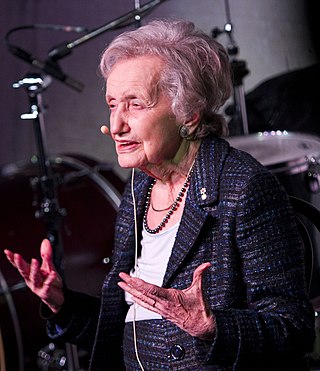
Brenda Milner is a British-Canadian neuropsychologist who has contributed extensively to the research literature on various topics in the field of clinical neuropsychology. Milner is a professor in the Department of Neurology and Neurosurgery at McGill University and a professor of Psychology at the Montreal Neurological Institute. As of 2020, she holds more than 25 honorary degrees and she continued to work in her nineties. Her current work covers many aspects of neuropsychology including her lifelong interest in the involvement of the temporal lobes in episodic memory. She is sometimes referred to as the founder of neuropsychology and has been essential in its development. She received the Balzan Prize for Cognitive Neuroscience in 2009, and the Kavli Prize in Neuroscience, together with John O'Keefe, and Marcus E. Raichle, in 2014. She turned 100 in July 2018 and at the time was still overseeing the work of researchers.
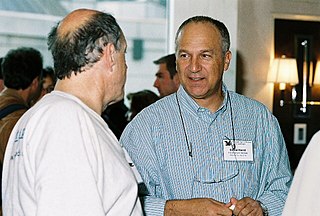
David Harel is a computer scientist, currently serving as President of the Israel Academy of Sciences and Humanities. He has been on the faculty of the Weizmann Institute of Science in Israel since 1980, and holds the William Sussman Professorial Chair of Mathematics. Born in London, England, he was Dean of the Faculty of Mathematics and Computer Science at the institute for seven years.
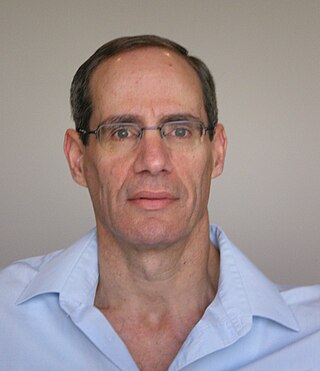
Noga Alon is an Israeli mathematician and a professor of mathematics at Princeton University noted for his contributions to combinatorics and theoretical computer science, having authored hundreds of papers.
The Gruber Prize in Neuroscience, established in 2004, is one of three international awards worth US$500,000 made by the Gruber Foundation, a non-profit organization based in Yale University in New Haven, Connecticut.
The Kavli Foundation, based in Los Angeles, California, is a foundation that supports the advancement of science and the increase of public understanding and support for scientists and their work.
Yadin Dudai is a neuroscientist, Professor (emeritus) of Neurobiology at the Weizmann Institute of Science in Rehovot, Israel, and the Albert and Blanche Willner Family Global Distinguished Professor of Neural Science at New York University (NYU).

Aharon Razin was an Israeli biochemist.
Nancy Jane Kopell is an American mathematician and professor at Boston University. She is co-director of the Center for Computational Neuroscience and Neural Technology (CompNet). She organized and directs the Cognitive Rhythms Collaborative (CRC). Kopell received her B.A. from Cornell University in 1963 and her Ph.D. from Berkeley in 1967. She held visiting positions at the Centre National de la Recherche Scientifique in France (1970), MIT, and the California Institute of Technology (1976).

Hermona Soreq is an Israeli professor of Molecular Neuroscience at The Hebrew University of Jerusalem. Best known for her work on the signaling of acetylcholine and its relevance in stress responses and neurodegenerative diseases such as Parkinson's and Alzheimer's.
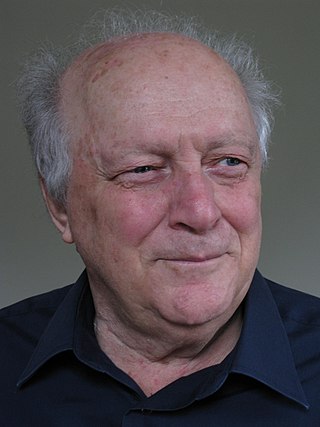
Moshe Abeles is an Israeli brain researcher and neurophysiologist. He is emeritus professor at the Hebrew University in Jerusalem and at the Life Science Faculty of Bar Ilan University in Ramat Gan.
Laurence Frederick Abbott is an American theoretical neuroscientist, who is currently the William Bloor Professor of Theoretical Neuroscience at Columbia University, where he helped create the Center for Theoretical Neuroscience. He is widely regarded as one of the leaders of theoretical neuroscience, and is coauthor, along with Peter Dayan, on the first comprehensive textbook on theoretical neuroscience, which is considered to be the standard text for students and researchers entering theoretical neuroscience. He helped invent the dynamic clamp method alongside Eve Marder.

The Research, Innovation, and Dissemination Center for Neuromathematics is a Brazilian research center established in 2013 at the University of São Paulo that is dedicated to integrating mathematical modeling and theoretical neuroscience. Among the core missions of NeuroMat are the creation of a new mathematical system to understanding neural data and the development of neuroscientific open-source computational tools, keeping an active role under the context of open knowledge, open science and scientific dissemination. The research center is headed by Antonio Galves, from USP's Institute of Mathematics and Statistics, and is funded by the São Paulo Research Foundation (FAPESP). As of 2019, the co-principal investigators are Oswaldo Baffa Filho (USP), Pablo A. Ferrari (USP/UBA), Fernando da Paixão (UNICAMP), Antonio Carlos Roque (USP), Jorge Stolfi (UNICAMP), and Cláudia D. Vargas (UFRJ). Ernst W. Hamburger (USP) was the former director of scientific dissemination. NeuroMat's International Advisory Board consists of David R. Brillinger, Leonardo G. Cohen (NIH), Markus Diesmann (Jülich), Francesco Guerra, Wojciech Szpankowski (Purdue).
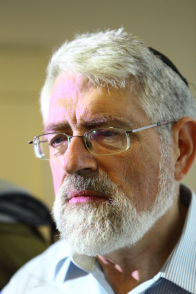
Haim Sompolinsky, is the William N. Skirball Professor of Neuroscience at the Edmond and Lily Safra Center for Brain Sciences, and a professor of physics at the Racah Institute of Physics at The Hebrew University of Jerusalem, Israel. He is also a visiting professor in the Center of Brain Science at Harvard University and the director of Harvard's Swartz Program in Theoretical Neuroscience. He is widely regarded as one of the leaders of theoretical neuroscience.

Abraham Zangen is an Israeli professor of neuroscience, head of the brain stimulation and behavior lab and chair of the psychobiology brain program at Ben-Gurion University of the Negev (BGU).
Misha Tsodyks is a leading theoretical and computational neuroscientist whose research focuses on identifying neural algorithms underlying cortical systems and cognitive behavior. His most notable achievements include demonstrating the importance of sparsity in neural networks, describing the mechanisms of short-term synaptic plasticity and working and associative memory.
References
- ↑ "IBT awards". Braintech, 2019. Retrieved 7 February 2020.